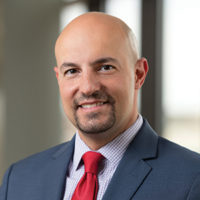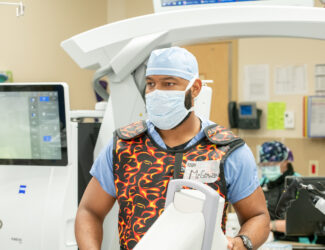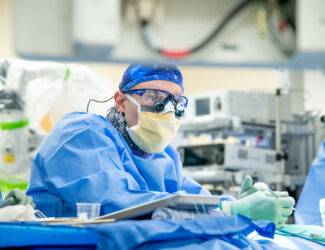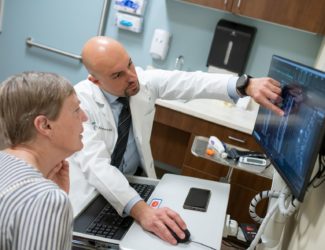Spinal fusion surgery recovery is different for every patient. Typically, patients will spend 1-4 nights in the hospital and begin feeling much better after the second or third night. You will need to restrict your activity for the first 2 weeks, and it will likely be about 4-6 weeks before you can return to your normal routine. It takes most patients about 3 months to feel fully recovered from spinal fusion surgery. For some people, particularly those with other health issues or patients who had multiple levels of fusion, it may take closer to a year to fully recover from spinal fusion.
In this blog post, I talk about what to expect immediately after spinal fusion surgery and during the short-term recovery period. Head over to this blog post about what to expect six months after spinal fusion by my colleague, Dr. Josh Beckman, if you are interested in more long-term results.
What to Expect During Recovery After Spinal Fusion
At Neurosurgery One, we use a program called Enhanced Recovery After Surgery (ERAS) that will help you recover faster. As part of this program, you will attend a class before your surgery to learn what to expect in the hospital and when you go home after surgery. This class also will teach you how to prepare your home and how to modify your daily activities until you have recovered.
For the first two weeks, you will not be allowed to drive, and I also say, “No BLT.” This means no bending, lifting or twisting. I don’t want you doing these things not so much because you can’t but because I want to restrain you from overdoing it and re-injuring your back. In your spine class and again in the hospital, you’ll be taught how to sit down, stand up and how to get into and out of bed in ways that don’t require bending your back.
After the surgery, your back will feel stiff and sore, which might make it uncomfortable at first to sit, stand, or move. However, it’s important that you get out of bed and start moving as soon after surgery as possible. I’ll want to see you walking every 30 minutes or so, even if just a few steps, and being out of bed for every meal. This regular, gentle movement helps stretch your muscles and helps circulate oxygen, which helps reduce pain and speed up your recovery.
Reduced Physical Activity During Spinal Fusion Recovery
I will see you about two weeks after your lumbar spinal fusion surgery to assess your recovery and, if things are going well, to clear you so that you can begin to do more activities. In those first two weeks, you should not do any sort of exercises or stretching while you are recovering at home. This includes stopping things like:
- Exercise (running, bike riding, weight lifting, etc.)
- Lifting heavy objects
- Carrying objects for long distances
- Running errands
We do encourage walking. However, don’t overdo it. Rest when you feel tired. Pushing yourself won’t help you heal any faster. In fact, in most cases, it will simply make you feel worse and may even slow down your recovery.
As you continue to feel better and your pain diminishes—especially when you are back to feeling like your old self—you might be tempted to jump back into activities that you were forced to give up. But it’s super important that you take the long view on this—it’s better to give your back a little time to fully heal than missing out on those activities for a much longer time due to re-injuring your spine.
While many patients believe they should start exercises to strengthen their back, I typically don’t recommend starting physical therapy until three months after spinal fusion surgery. Again, this gives your back adequate time to heal.
Controlling Pain During Spinal Fusion Recovery
We get many questions from our patients about pain during spinal fusion recovery. First, you should expect some pain. That’s your body’s way of telling you to take it easy and it helps ensure that you don’t do too much too soon.
Using our ERAS model, we take action before your lumbar fusion surgery to reduce pain after the surgery. For instance, if you are taking opioids for spine pain, we will help you reduce or eliminate those so that your body will respond better to medication to control pain after surgery. During surgery, I also may use non-opioid medications that help control pain. For instance, I might give you an injection of an analgesic called Expareal that slowly breaks down in your body and provides pain control up to 72 hours after surgery.
Using these opioid alternatives will help provide relief for the initial time during recovery from spine fusion surgery. After that, many of my patients find that they are able to manage their pain with over-the-counter anti-inflammatory medications or Tylenol®. If you need a prescription to help manage pain in the short term, I like to use non-opioid medications such as Celebrex® (an anti-inflammatory), gabapentin (an anti-convulsant), and muscle relaxers.
You will be asked before surgery to provide a list of all prescriptions, over-the-counter medications, and supplements you are taking to ensure that anything we prescribe does not have a negative interaction. It’s important that you take any medications we prescribe only as instructed and that you tell us if you start taking any other type of medication.
What You Can Do to Help Your Own Recovery from Spinal Fusion Surgery
In addition to following the instructions I’ve outlined here, there are several things you can do before surgery to help speed up your recovery. These include:
-
- Reduce opioid use: I mentioned this above, but it’s worth repeating because so many people use opioids to control their back pain. If you take any type of opioid pain medication, you actually will feel more pain after surgery because your body has grown accustomed to the pain medication. While it’s difficult to eliminate opioid use, we can help you safely reduce your dosages just prior to surgery.
- Stop smoking: Smoking delays and even prevents bone healing, which makes the failure rate of the fusion extremely high.
- Stop marijuana use: The impact of prior marijuana use on surgery recovery and outcomes as well as pain control is not fully understood, so I like to err on the side of safety and advise my patients to eliminate marijuana use prior to surgery.
- Take calcium and Vitamin D supplements: Making sure you have adequate intake of these nutrients helps improve fusion rates. If you have osteoporosis or weak bones, I will refer you to our Bone Health Clinic, which can help you strengthen your bones prior to fusion surgery so that your surgery outcome is better.
- Eat a nutritious diet: Eating a healthy diet, particularly one high in lean proteins, can help improve wound healing. You’ll learn more about ways to use your diet to help your recovery in our spine class.
Watch this video on spinal fusion and continue reading below for additional information on spinal fusion recovery.
Common Questions About Spinal Fusion Recovery
Now that I’ve detailed what recovery from lumbar fusion surgery will be like, I’ll give the short answers to the most common questions I get from my patients about this topic:
When will I be able to return to normal activity after lumbar fusion surgery?
It will take a while to return to your normal activities after spine fusion surgery. This is not because you cannot do these activities but because I don’t want you doing them for fear of injuring yourself. It might be frustrating to wait around at home, especially as you will most likely feel much better compared to how you felt before surgery, but never rush your recovery. Always wait until your doctor gives you permission before starting a new activity.
When can I drive after lumbar fusion?
I recommend against driving for 2 weeks. In fact, you should avoid riding in a car for longer than 30 minutes at a time for this time frame as well. If you do have to take a long car ride, take breaks every 30 minutes to move around and stretch.
When can I go back to work after lumbar fusion?
If your job doesn’t require any strenuous activity, you will likely be able to go back to work 2 weeks after your spinal fusion surgery. For more labor-intensive jobs, most patients can return to work after 3 months. However, these are general guidelines for spinal fusion recovery. You may be able to go back to work quicker based on your health and recovery, or it may take you a bit longer.
When can I exercise after lumbar spinal fusion?
Most people can start some form of prescribed exercise during spinal fusion recovery after being cleared at your 2-week post-op visit. Depending on what type of other exercise you want to do, you may have to wait anywhere between 4-6 weeks, even up to 3 months, before you start working out again.
When should I call my doctor with concerns during lumbar spinal fusion recovery?
Always call your doctor if you have a concern about your health or recovery process. This is especially true if you notice any of these signs:
- Numbness or tingling in your legs or bottom
- Weakness in your legs
- Pain that won’t go away even after taking medication
- Fluid or pus draining from your incision
- Swelling or redness
- Fever
For more information on this topic, I recommend these resources:
- Learn more about our Enhanced Recovery After Surgery program that decreases recovery time, opioid usage and pain while improving outcomes.
- Read this blog post on how to prepare before surgery for your spinal fusion recovery.






